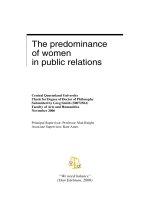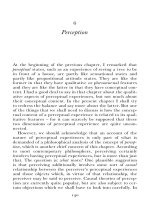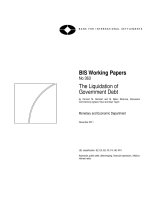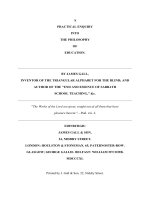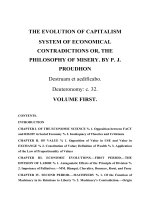How does the philosophy of Government affect public policy?
Bạn đang xem bản rút gọn của tài liệu. Xem và tải ngay bản đầy đủ của tài liệu tại đây (204.78 KB, 6 trang )
TAMPERE UNIVERSITY
Institute Of Management
MASTER PROGRAM OF PUBLIC POLICY AND
FINANCE MANAGEMENT
Topic:
How does the philosophy of Government affect public policy?
Student’s Name:
Date of birth:
Email:
Course:
1
INTRODUCTION ABOUT GOVERNMENT AND PUBLIC POLICY
In the United Kingdom, the word "Government" is understood in the narrow sense as an
implementing agency control of his country at a particular time. In American - English, an organization
that has the same functions is called “Administration”, not “Government” . In American - English, the
word “Government” refers to a much larger system which runs a country.
Although those definitions are different and so wide, normally we can define Government as an
agency including the legislative, executive and judicial branches. Thus the Government is able to
implement and make the necessary policies of a country.
Public policy is what Governments choose to do or not do (Thomas R. Dye, 1984). Or it is the
whole activities of Government that directly or indirectly impact the lives of people. Public policy is a
part of a general policy of each country, it is the management tool of the State.
EFFECTS OF GOVERNMENT’S PHILOSOPHY ON PUBLIC POLICY
Political power can only be established in practice through political institutions, and political
institutions can operate and exist in long-term or not depends very much on the subjects who capture
rules and operate politics - political people. Political people are citizens of a Sate and they are
characterized in the possibility of rational argument (logos) and cooperative action (praxis). Gathering
these people are political apparatus of a country.
The exchange of public policy is regarded as an acquisitions in which the Government sells
goods, goods is what people think the Government should do, and on the basis of the social contract.
Picture: relationship between price of Government and amount of public policy
Public in public policy is not merely collective (people who are adjusted and impacted by
policy) like the concept of European and American scholars; public also means the State, the
Government
From the definitions of Government and public policy, we can see that the Government or the
philosophy of Government has effect on public policy.
Government is the subject issuing public policy. Different Governments with different
philosophies will make different public policies. We can see it clearly in Indian under two different
Governments- Deli and Mongo dynasty.
Under Delhi dynasty, policies are racial discrimination and religious discrimination; imposed
Islamic, caused the Indian people abandon the old religions (Buddhism, Hinduism) to support Muslims.
2
The leaders also won for himself priorities of economic and politic (as preferential in land and hold
important positions in the State apparatus). For example, in addition to the land tax (1/5 of harvest), the
non-Muslims must pay an additional, called "tax pagan" -jaziah. Under the policy of this dynasty, the
people were extremely urgent. Because of that reason, although the later Kings tried to implement soft
policies but this dynasty did not last long.
In contrast, under the Mongo dynasty, especially under King Acoba dynasty, it was the most
prosperous period in the history of feudal of India. At this time, the Government applied more positive
policies, including:
+ Built a strong Government based on the equal links of aristocracy of Muslim and Hindu
religion.
+ Saturated classes and religions, built national reconciliation.
+ Redistributed the land, imposed reasonable tax rate and consisted measurement system.
+ Encourage and support the creation of culture, art.
With these policies, the Indian social was stable, economic developed and culture had many
new achievements, Acoba was regarded as a national hero
Thus, we can see: two different Government with two different philosophies gave two different
policies. Although this is a feudal State, public opinion seemed not to be care but we can see that the
Government with positive policy will receive support from the people, then this Government will be
more solid. In contrast, the Government having austerity policies, oppression and exploitation people
will cause discontent among the people
Other example is the policy of the Greek Government in debt crisis in 2010. The public debt
reached up to 110% of GDP, the Greek faced crisis and difficulty in paying old debts, it was hard for
them to sell new debt at reasonable prices; even the Greek could be expelled completely from the debt
market. In response, the Greek Parliament issued austerity measures, including cutting money spent on
public sector, restraining to pay salary and bonuses, stopping to pay retiring allowance; increasing
value-added tax, increasing tax of fuel, tobacco, alcohol and luxury goods.
The policy of the Greek Government was strongly opposed. The general strike took place to express
disagreement with the austerity policies of the Government.
3
Picture: General strike in front of The Greek Parliament ‘s Head office
From the above analysis we can affirm: Philosophy of Government strongly influence public
policies that Government made. However, the support or opposition of the people with that policy
decides the existence of the policy, even the existence of the Government (the coup in Thailand
occurred due to military discontent with the Government’s policy).
People do not give the Government political power, the ownership of all rights, but just make
the government use the rights to practice their sovereignty. At the same time, people always inspect,
supervise the Government in the use of those given rights, if necessary, they will reclaim, not give the
rights to use it.
CONCLUSION
In short, the philosophy of the Government decides the existence or non-existence of public
policy as well as decides how these policies are, who these policies serve the interests for
Under the military dictatorship, the army took control or under despotic Government, it usually
has no concern for public opinion or individual rights.
Public opinion is concerned only under the democratic Government. In this form of
Government, people have rights to suggest for making the public policy of the Government (through
referendum, meeting voters ). The implementation of public policy are supervised, inspected and
evaluated by people. Here, public policy does truly have collective feature because of the nature of the
democratic government's philosophy is to build government of the people, by the people and for the
people.
Public policies is an important management tool of the State. By issuing and implementing
policies, the objectives of the State are realized. In the past few decades, in the world there have been
many countries accept to change part or most of their State apparatus as political, economic and social
changes.
4
Although there still exists many types of Government with many different philosophies, the
general trend of public policy of modern Government is to serve the purposes of the society and
community.
5
Reference
Barker, E., ed. 1947. Social Contractas: Locke, Hume, Rousseau. Oxford Univesity Publishing
house.
Gayer, H. S.2007. Public policy, 8
th
editor. Boston: McGraw-Hill/Irwin.
Goodin, R.1982. Political and Public Policy Theory. Chicago: Chicago Univesity Publishing
house.
Rosen, Harvey S. 1999. . Public policy, 5
th
editor. Boston: McGraw-Hill/Irwin.
Greece - General strike against reducing officers. Accessed date: 5
th
January 2015 at
/>cong- wish
6

